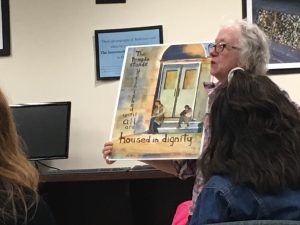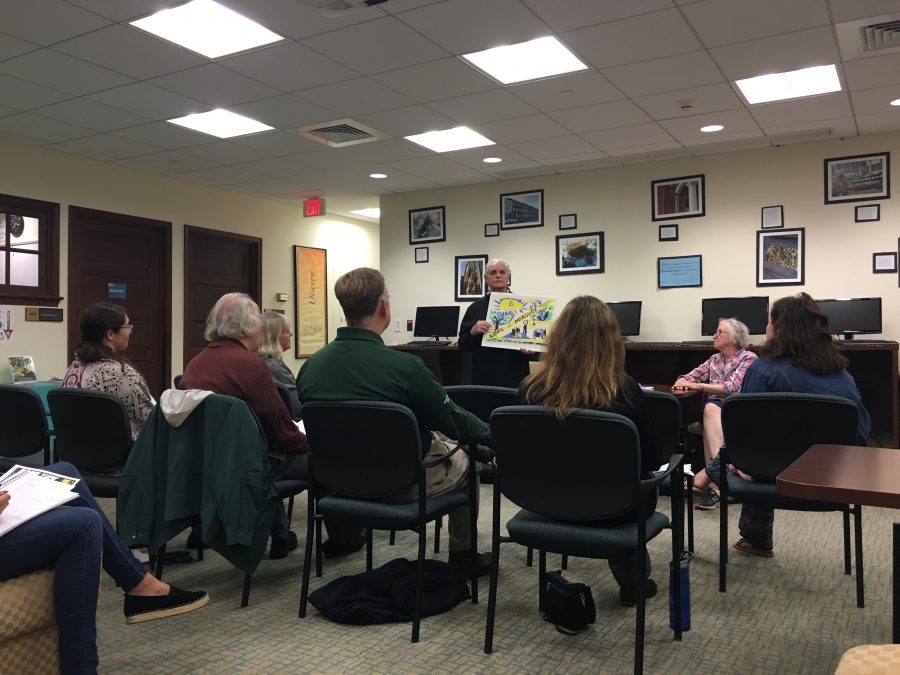On Thursday, Nov. 2, founders of Viva House Brendan Walsh and Willa Bickham hosted a book talk in the CCSJ Common Space. Walsh and Bickham discussed their work with the Catholic Worker Movement and the Southwest Baltimore (Sowebo) community and introduced their book “The Long Loneliness in Baltimore: Stories Along the Way.”
Viva House opened in 1968 and provides shelter and food for Baltimore’s most disadvantaged people. Their book, a compilation of essays, poems, stories, and art, has sold over 1,000 copies since October 2016. Viva House also serves to advocate for non-violence and justice in Baltimore’s current legal system.
Bickham began the conversation, emphasizing the importance of environmental care as a solution to poverty.
“That’s how you make a change in society—farming and taking care of the Earth,” she said.
She then recounted when 32 of Baltimore’s homeless people caught Hepatitis A due to the  uncleanliness of the public bathrooms.
uncleanliness of the public bathrooms.
“To protest, the people marched down to City Hall and occupied all the bathrooms. They even brought a dummy and put it in one stall to make it seem like someone was using that bathroom,” Bickham said.
Walsh then pointed out specific silk screens, illustrated by Bickham, and explained the importance of artwork in their mission.
“Graphics are so important. We wouldn’t have sold any books without it,” Walsh said.
The first silk screen they showed depicted people serving the homeless at a soup kitchen. A yellow sash that stated “Love is the measure by which we’ll all be judged” split the painting in half.
“At the soup kitchen, people brought bags of food, and then the homeless would take it with them,” he said.
 Walsh then introduced the significance of the screens, as their images help fight for equality in Baltimore.
Walsh then introduced the significance of the screens, as their images help fight for equality in Baltimore.
“Baltimore has not improved since we got here,” he said. “The poor will always—always—be here,” he said.
For Walsh and Bickham, part of that poverty comes from Baltimore’s criminal justice system.
There are currently 100,000 incarcerated people in Baltimore’s jails, decreasing the city’s population by a third, and certain laws, like Zero-Tolerance and Deinstitutionalization, that severely affect Baltimore’s poorest people.
“[Law enforcement’s] key thing was to get people off the streets—that’s all they wanted to do,” Walsh said. “And now they say we don’t need state mental hospitals unless person is a danger to themselves or others”
Bickham expressed her disappointment in government spending.
“People won’t invest in the poor, but [the government] built two new stadiums in Baltimore. And guess who paid for it? Us,” she said
The couple recounted their experiences since the founding of Viva House and explained the lack of resources their visitors had access to.
“People showed up with medicine and tokens to get to us and expected us to help them,” Bickham said. “Helping them was overwhelming, so when the house became overcrowded, we started to understand the immediate help these people needed.”
Walsh elaborated Bickham’s claim, emphasizing the urgency to help Baltimore’s disadvantaged and the need for a change in the law enforcement system.
“Our problems stem from our acceptance of this filthy, rotten system,” he said.
Bickham and Walsh continue to advocate for Baltimore’s poorest and hope to provoke change in the system.














































































































Anonymous • May 5, 2018 at 3:19 pm
5
Anonymous • Mar 12, 2018 at 8:09 pm
0.5
Anonymous • Nov 11, 2017 at 10:16 pm
4.5